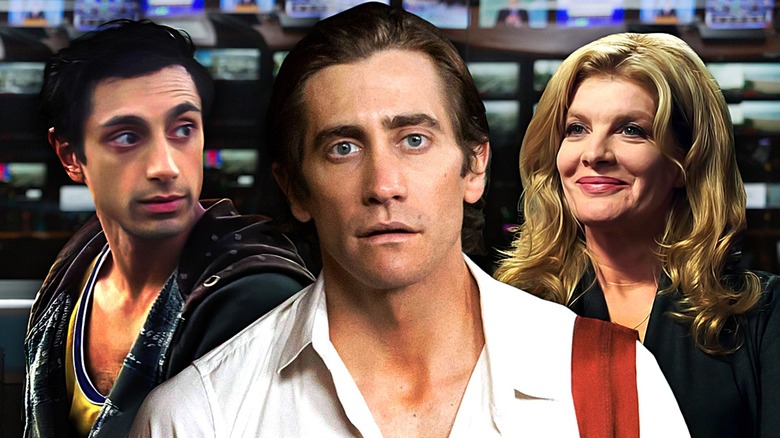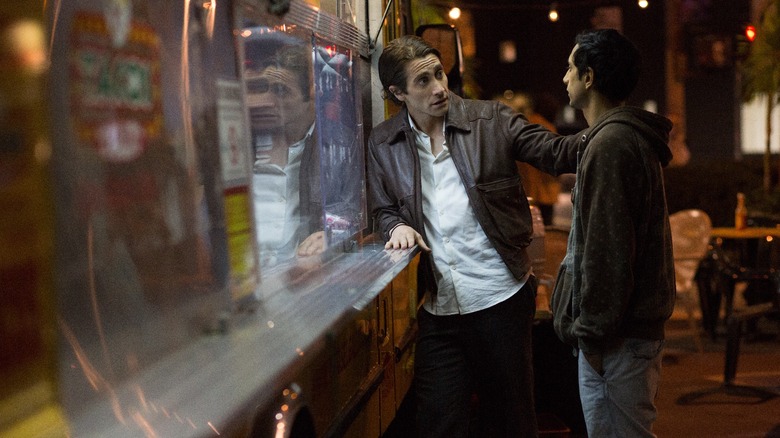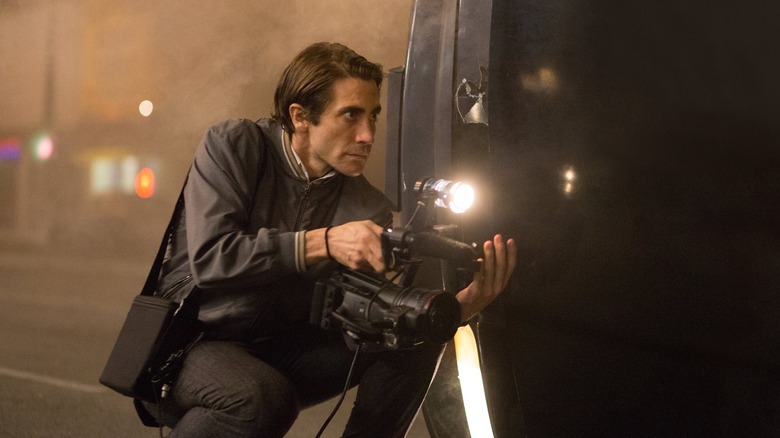10 Years Ago, Jake Gyllenhaal Starred In The Perfect Crime Thriller That Was Robbed At The Oscars
Dan Gilroy's "Nightcrawler" is designed to make you feel ill at ease. When small-time thief Lou Bloom (Jake Gyllenhaal) is first introduced, the discomfort evoked stems from the desperation late-stage capitalism embeds into our souls and how it pushes us towards unsavory avenues. However, once Bloom pawns a stolen bicycle for a camcorder, and we are forced to dissect violent, extreme crime scenes with him, the true, eerie heart of "Nightcrawler" is revealed. Bloom isn't just pushed into taking such ethically void measures to ensure his survival: he actively hungers for these excesses, as seen in his wide-eyed, unblinking gaze, which Gyllenhaal invests with an unsettling intensity that grants "Nightcrawler" its discomfiting tint. It is an experience that comes alive solely because of him, and Gyllenhaal carries this burden by channeling a haunting, career-defining performance that is both subtle and felt deeply in our bones.
Gyllenhaal is no one-hit wonder when it comes to inhabiting roles that explore similar nuance. His turn as the overly meticulous, borderline-obsessive Detective Loki in "Prisoners" emerges as a foil to his Lou Bloom, while he embraced the inner workings of a vengeful novelist in the brilliant "Nocturnal Animals." The actor's range was best exemplified in his performance in "Brokeback Mountain," for which he got the Best Supporting Actor nomination at the Academy Awards in 2006. However, this is the only instance of Gyllenhaal getting close to a nod at the Oscars — which is baffling, to say the least — with "Nightcrawler" only getting a Best Original Screenplay nomination, even though critical discourse surrounding the film heavily focused on Gyllenhaal's unforgettable performance, which anchors everything else that Gilroy's impressive directorial debut has to offer.
Gyllenhaal was, as the kids say, robbed at the Oscars with regards to this particular performance, but it is never too late to touch upon the legacy "Nightcrawler" has left behind, and what it has to say about the abhorrent pitfalls of capitalism and its direct relation to unethical journalistic practices that puts shock value over the unblemished truth.
There is something deliberately repulsive about Nightcrawler
The most frightening aspect of the film is Bloom himself, our titular nightcrawler, who comes alive in the dark like some sort of anti-vigilante ready to document, tamper with, and even trigger crime scenes that will fetch a heavy amount after being sold. After witnessing another freelance photojournalist in action, Bloom takes up the profession overnight, feeling eerily at ease as he seeks out gruesome accidents or break-ins to film. At first, he acts as a neutral bystander simply seeking out these sick thrills, but after a conversation with KWLA director Nina Romina (Rene Russo), Bloom comes to understand that the game is dirtier than he initially envisioned. The more horrifying the footage, the higher the ratings, especially when the crimes take place in specific neighborhoods (predominantly white, upper-class to be precise) and have some sort of gruesome edge attached to them.
Objectivity is no longer an element in Bloom's voyeuristic gaze, as he must manipulate and tamper with crime scenes enough to maintain the luridness demanded by the news channels that broadcast them. Withholding information becomes key to capitalizing on profit here, as opportunistic desires and dishonesty go hand and hand for a man with virtually nothing to lose, except his drive to consume the next extreme high that will translate into cash. "If it bleeds, it leads," is a mantra that manifests in its ugliest form, emboldened by channel executives like Romina, who care little about the truth while chasing ratings that are a direct result of toxic confirmation bias.
Every relationship in "Nightcrawler" is tinged with caution, and is inherently transactional: even the financially desperate Rick (Riz Ahmed) is but a pawn for Bloom once he hires him for assistant work, and lets him die after Rick blackmails him for withholding information from the authorities. There is no social camaraderie present in this world, as only the most repulsive form of cut-throat competition birthed by a broken economy and information dissemination system is allowed to exist.
Gyllenhaal's Lou Bloom unnerves us for a reason
The bleak, agenda-driven world of "Nightcrawler" feels perpetually drenched in darkness even during daytime, as if the warmth of the sun is dimmed and cannot reach someone like Bloom, who remains detached from all things pleasant or authentic. If we root ourselves in his perspective, Bloom does not have the luxury to ache for these softer sentiments, as his unhinged desperation has kept him alive so far, so it is second nature for him to rely on such unsavory instincts.
Director of Photography Robert Elswit injects a sense of morbid beauty in every scene Bloom is in, and we are compelled to follow his gaze and inhabit it, be it when he's capturing the aftermath of a terrible car wreckage or the last words of a dying man he has willingly betrayed. The results are discombobulating, and that is the purpose, as his crime scene footage is not that of an uninvolved bystander, but an involved voyeur reveling in his capacity to twist and deform the truth.
As Bloom's work gains traction, he develops a taste for power, and this hunger gradually displaces the need for survival, especially when he realizes that he can get away with his amoral actions as long as corrupt channel executives keep feeding into his compulsions. When Bloom coerces Romina into sexual favors in exchange for offering more "cutting-edge" crime footage, it is not just an act of sexual predation, but a ruthless affirmation of flipped power dynamics, where he wants to prove that he can force an authority figure into doing his bidding. Gyllenhaal plays these scenes with the same gaunt, blank-stared glee that he adopts during his night-crawling, creating a deliberately repulsive picture of capitalism-fueled parasitic hunger that never fades. It's truly strange that he did not get a nomination for such a remarkable performance.
The film does not end with Bloom getting his comeuppance or stumbling upon some agonizing epiphany about his lack of ethical drive: instead, we see Bloom flourishing even after he is subject to interrogation, as the authorities do not have the necessary evidence to prove his culpability. What Bloom does is widen his noxious network by hiring underlings to do his bidding, and this widening net of exploitation cements the ghastly reality of corporations capitalizing on desperation and demand, creating an unending cycle of lies and deception. This also ensures that prejudice-based echo chambers are sustained and validated by what gets broadcast as the truth, with persecuted minorities getting the shortest end of the stick as long as people like Lou Bloom exist.


